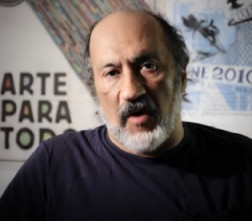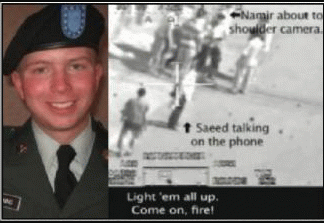In one of the case's most disturbing pre-trial hearings, Judge Col. Denise Lind ruled last week that prosecutors can offer as evidence files seized from Osama Bin Laden's computer as well as the testimony of a Navy Seal, part of the Bin Laden assasination team, who found them. His identity will not be revealed and the defense can cross-examine him only from a very specific and limited list of court-approved questions.
The ruling is important not only because it shows the almost unimaginable absurdity of the Manning case but because it reveals the true intent of the Obama Administration in pursuing it.
The hearing was about the "standard of proof" necessary to prove two charges: espionage and aiding the enemy. It also took up what kinds of evidence would be permitted in the trial to support those charges.
Bradley Manning and the Infamous Video by Georgia Green Party
According to the prosecutors, Manning committed espionage and aided the enemy by giving them important intelligence and he did that by putting it on the Internet. That's it; that's the crime. His real intent is irrelevant. The government is arguing that, if you put something on the Internet that some nefarious rascal downloads, you are effectively aiding that person materially in any "relevant" crime he or she might commit. It doesn't matter if there's no evidence that the person read it and no need to prove that you intended for him or her to retrieve it. Effectively, it makes the use of the Internet a potential crime.
Judge Lind ruled that to prove "espionage" you have to show that the defendent actually intended for this material to be read by the enemy; that was a defeat for the prosecution. But, she ruled, the government can pursue its theory to support the "aiding the enemy" charge.
One up and one down for Pvt. Manning. Two down for the rest of us. The Judge's decision is important for the trial but what's most important for all of us is what the Obama Admininstration is thinking and doing. It's now clear that the Administration believes that these very same acts and standards apply to both crimes. While the "aiding the enemy" charge only relates to military personnel, the "espionage" charge can be levelled at everyone and, while it failed to win the ruling in this case, it's clear that President Obama believes he can charge any of us with "espionage" for using the Internet as it's currently used.
For those who aren't familiar with this case or need an update, Pvt. Bradley Manning is a whistle-blower. Sometime in 2010, when he was working as an information technologist with the Army, Manning sent about 750,000 computer files to Wikileaks.
These included a shocking video of a U.S. Air Force helicopter firing at a wedding party in Bagdad, killing several people, and then firing at an ambulance there to evacuate the injured. All the while, ground support and helicopter personnel laughed and encouraged the pilot to "kill" and "shoot" the people, as if playing a video game with real humans as targets. The video became a major embarassment to Washington and, while there was a lot about the Wikileaks revelations that made Washington very unhappy, this video provoked the final pull on the trigger. The U.S. government determined to go after Wikileaks and the source of this classified material.
A short while after turning over the material, Manning began corresponding and chatting on-line with Adrian Lamo, a technologist who had built a reputation for hacking into corporate servers, telling the company about it through an intermediary and then offering to fix the vulnerability for money. Lamo befriended Manning, spending hours with him in on-line chat rooms and email talking about the difficulties Manning was having. Manning is gay, he told his new friend, and he found the often homophobic military culture punishing. But, he also told Lamo, he had all these documents that made clear how wrong the war in Iraq was and holding that truth from the world was eating at him so he finally published them.
Upon reading that, Lamo turned Manning in and the torturous case began.
Manning doesn't deny he leaked the files and, in fact, he has already pleaded guilty to that charge, a plea the judge is still considering. He's explained his actions in an audio tape smuggled out of jail and published by Democracy Now. The tape is stunning for what it says about the information and about Bradley Manning.
This is a case, after all, in which homophobia has already played a major role. It's hard to think of any public figure who has been as "preference-maligned" as Manning by both the government and the media. Almost every article published about the case pictures him as a confused, frightened gay man, an emotional cripple and weakling who was pushed to the point of near-suicide by a military system he couldn't adjust to. That condition, the mainstream media tells us, was exacerbated by the torturous treatment Manning received during his time in jail, much of it spent in solitary confinement.
This largely unchallenged gay-bashing, sketching an image that meshes just about every homophobic bias plaguing our culture, took an uglier step when pundits started asking an over-loaded question: why was a kid who was on the verge of a crack-up allowed access to such sensitive information?
This attack campaign encountered a devastating challenge when Manning finally spoke to us in that tape, emerging as a completely controlled, thoughtful, highly principled and courageous hero. Despite the brutal treatment he had endured, he sounded confident and strong as iron.
(Note: You can view every article as one long page if you sign up as an Advocate Member, or higher).






